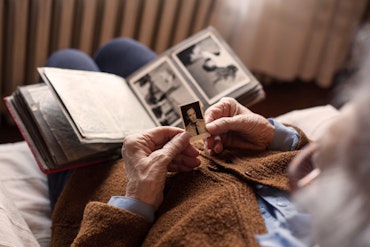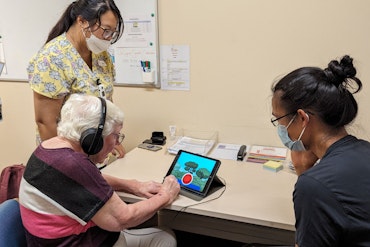Designing towards the best death
The passion for high quality palliative care from one aged care provider’s Chief Executive Officer (CEO) has led to a long and informative journey to create a design for the ‘best death possible’ for its residents.

One of the RMIT University workshops for the project (Source: Bolton Clarke)
Bolton Clarke has been working in partnership with RMIT University to create the new co-design project, the brainchild of Bolton Clarke CEO Stephen Muggleton, which aims to develop a model for best practice end of life care in residential aged care communities.
Design Integration lead for Bolton Clarke, Matiu Bush, has been the driving force behind the provider’s project which has resulted in a number of practical approaches to create a good death for aged care residents as well as improving understanding among all staff.
“The idea is to produce clear recommendations and practical, tangible strategies that will enrich the experience of residents and create exceptional end of life care,” he says.
“We’ve spent time with funeral directors, retirement village residents, the Coroner’s Court, vets who manage grief of pet owners.
“Australia has some brilliant examples of delivering really good end of life care in residential aged care communities, but no single best practice model.
“Co-designing service solutions with non-clinicians and people outside the industry allows for fresh thinking and fresh ideas from a variety of unique perspectives.”
Mr Bush says some of the most insightful and surprising input that was sourced as part of the initiative came from the veterinarians and the funeral directors.
“The vets we spoke to sent flowers and a card to the families who had lost their pets – it is a simple way to demonstrate how they value the relationship,” he says.
“As for the funeral directors, they provided some interesting perspectives – pointing out that family conflict needs to be dealt with early.
“They say the funerals are easy but it’s the family conflict that takes up a lot of time an energy of everyone involved.
“The insight was that as soon as a relative is admitted to a nursing home or aged care facility, we need to be working with the family to pull them back together as much as possible for the sake of the older person.”
A suggestion from the university students has also led to curation of resident’s identity being a big part of the project – with the aim of easing stress for families around the time of the funeral.
“Simple things like curation of a resident’s identity through the production of memory boxes and interactive storyboards could make a big difference, and might be used to educate staff and ensure people’s stories live on,” Mr Bush explains.
“It means that when the time comes, we can have worked on this earlier and just hand everything we have over to the family and say this is what we have been working on with your mum or dad.
“We are trying to do everything ‘upstream’ rather than leaving it until crunch time when people often rush and realise things aren’t done or sentimental photos or items are lost.
“To us, it’s really investing in the mental health of the family and make it a better time even though it is a sad time.”
While the project is currently being presented to the front line staff within the organisation for their input to help co-design it, Mr Bush says another key aspect of the initiative will be improving death literacy across the organisation.
“By improving death literacy across the organisation – throughout finance, HR and IT – it will mean the whole organisation will take on responsibility of understanding death, not just making it a clinical consideration,” he says.
“This will mean that there will be no letter sent out after someone has died, it will also mean better communication within the organisation to manage bereavement of staff as well as other residents and families when someone dies.”
Bolton Clarke hope to have the model up and running within their facilities by early 2018























